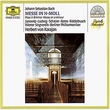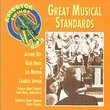| All Artists: Johannes Brahms, Leonard Bernstein, Vienna Philharmonic Orchestra Title: Brahms: 4 Symphonien Members Wishing: 0 Total Copies: 0 Label: Deutsche Grammophon Release Date: 10/25/1990 Genre: Classical Style: Symphonies Number of Discs: 4 SwapaCD Credits: 4 UPC: 028941557025 |
Search - Johannes Brahms, Leonard Bernstein, Vienna Philharmonic Orchestra :: Brahms: 4 Symphonien
 | Johannes Brahms, Leonard Bernstein, Vienna Philharmonic Orchestra Brahms: 4 Symphonien Genre: Classical
This was one of the least successful of Bernstein's projects for DG. His Brahms was always pretty wayward, but in addition to his usual stop-and-start approach to the music, he's slowed everything down by half, making the ... more » |
Larger Image |
CD DetailsSynopsis
Amazon.com This was one of the least successful of Bernstein's projects for DG. His Brahms was always pretty wayward, but in addition to his usual stop-and-start approach to the music, he's slowed everything down by half, making the result dull as well as demented. There are some great moments in the First and Third symphonies, particularly, and the playing is gorgeous, but these performances simply aren't competitive. --David Hurwitz Similar CDs
|
CD ReviewsDown with the tyranny of David Hurwitz! Eeesh | US | 02/11/2004 (5 out of 5 stars) "I find the writings of David Hurwitz to be patronizing and offensive. His reviews on Amazon (which are intended to be opionated and educational) all too often wind up being irritating and uninformative, replete with sweeping over-genralizations that leave me wondering if Mr. Hurwitz has ever actually listened to a single CD he has reviewed. They are also annoyingly predictable: endless praise for Richter and Mutter, etc., endless disdain for any historic or period performances. He criticizes orginality in performances and, unfortunately in many cases, the home reviewers at amazon sheepishly agree with whatever he says. I quote from his review of Goodman's Beethoven cycle, the greatest period recording of these masterworks, "These performances are so terrible that it's hard to believe anyone took them seriously...Utterly grotesque". Isn't this a little harsh for recordings that have been highly praised elsewhere and have recieved a home review average of 5 stars? Rather than pointing out the positives of an alternative approach to a piece, the proud Mr. Hurwitz has fallen to downright slander, while he elsewhere desperately panders his idols with repetitious adulation. There are many examples of this an Amazon. I also suspect that his rather bourgeois values have infected the whole "essential CD's" section of Amazon, which has the potential to be highly informative to listeners new to classical music." The Definitive Brahms Symphony Cycle? John Kwok | New York, NY USA | 04/12/2001 (5 out of 5 stars) "Without a doubt, this splendid set of recordings ranks with the Sanderling/Dresden Staatskapelle cycle as two of the finest Brahms symphonies cycles ever recorded. These are passionate, inspired performances where Bernstein succeeds in illuminating the complex emotional energy of Brahms' scores. Under his baton the Vienna Philharmonic responds as though it was a chamber orchestra, playing with ample warmth and brilliance. I have seen repeated references to Bernstein's version of the 2nd symphony as the definitive recording in the Penguin Guide and elsewhere; his versions of the other symphonies and overtures are superb too. Do not heed David Hurwitz's advice. If you are looking for a definitve set of Brahms' symphonies, then this has to be it." Awesome, Energetic, & Powerful Trevor Gillespie | San Jose, California United States | 04/05/2001 (5 out of 5 stars) "After having bought Brahms Symphony no. 1 individually, I had to buy the box set. Leonard Bernstein had recorded these symphonies before, but here he brings such raw emotional power to the symphonies, as well as the Haydn Variations and Overtures. DG has done an excellent job at recording these works. The digital sound is incredibly revealling with a full range of sound from top to bottom. I have a number of complete cycles of Brahms symphonies (i.e. Karajan, Abbado, Mackerras, and Solti). Although I love each cycle for various reasons, this one stands out particularly. The combination of forces between the Vienna Philharmonic and Bernstein produces a cycle of symphonies that remind you (if you've forgotten) just how incredible Brahms was as a composer. More specifically, my favorite highlights in these symphonies are as follows: As I said before, the sheer power of the first that Bernstein creates encouraged me to buy the box set. The finale is built incredibly sustaining a tension that is hard to match. The III movement in the fourth symphony has to be one of the best played--technically and emotionally. It is what I call a 'rollicking good time'. The third symphony as a whole is a great performance as well. This cycle is not the cheapest of Brahms symphony cycles, but it certainly is one of the very best. If you like how Leonard Bernstein conducted later in his life (a little slower with a heavier hand), then you're bound to love this set. Even if you don't care for the performances, you'll appreciate the beauty of the recorded sound."
|

 Track Listings (4) - Disc #1
Track Listings (4) - Disc #1

